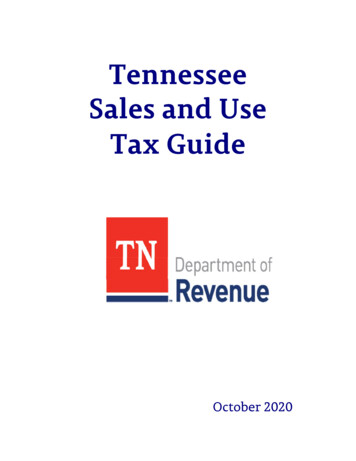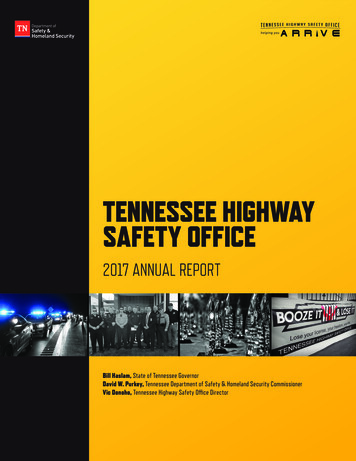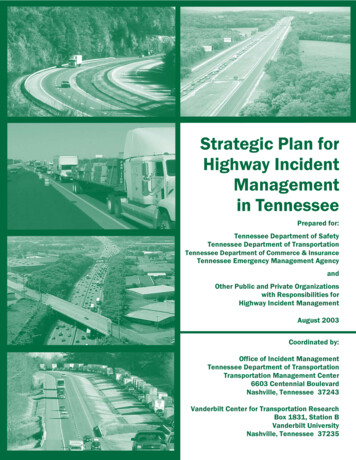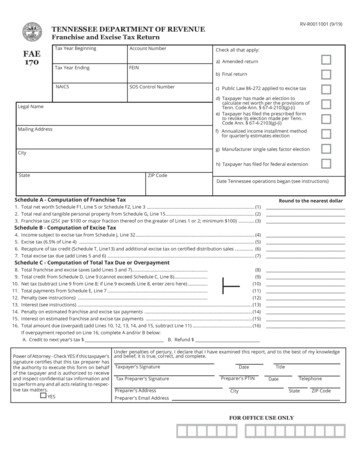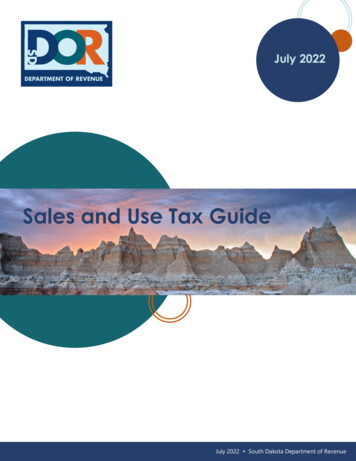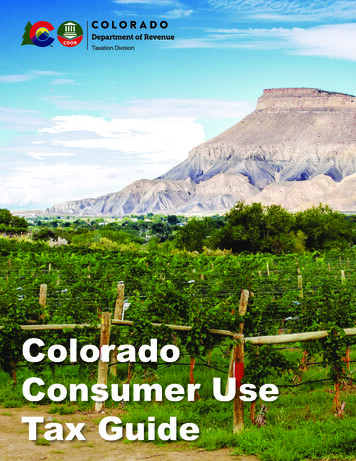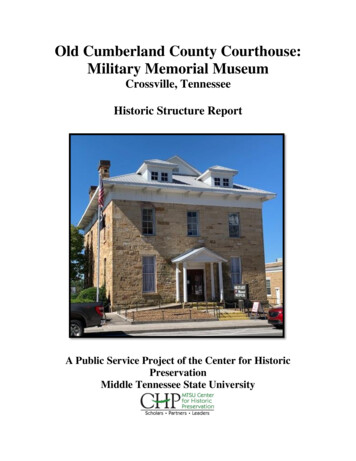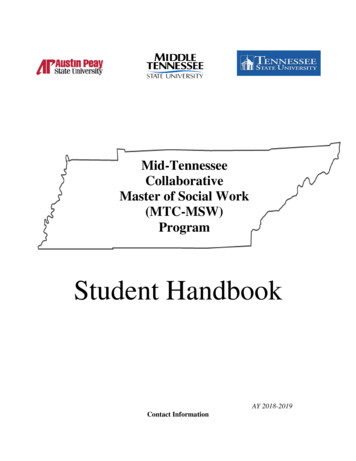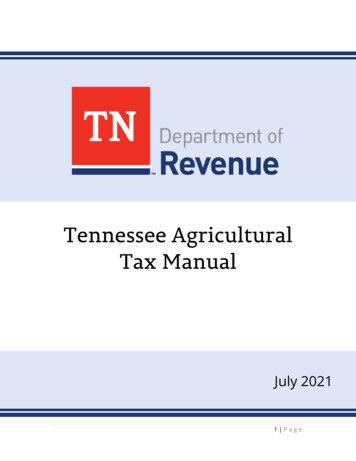
Transcription
Tennessee AgriculturalTax ManualJuly 20211 Page
ContentsChapter 1: Brief Overview of Tennessee Taxes.5Sales and Use Tax. 5Franchise and Excise Tax. 5Business Tax . 6Chapter 2: Sales and Use Tax – Overview and General Application .7Chapter 3: Agricultural Exemption Certificates.8Overview . 8Application for the Agricultural Exemption Certificate . 8Use of an Agricultural Exemption Certificate . 81.Necessary Documentation for Tax-Exempt Purchases . 92.Certificate Refusal . 10Certificate Renewal . 10Chapter 4: Qualification for Agricultural Exemptions .11Overview .11Qualifying Farmers, Timber Harvesters, and Nursery Operators. 111.Out-of-State Farmers may Qualify for Exemption. 122.Provision of For-Hire Agricultural Services . 123.Sawmill Operators . 134.Horse Trainers. 135.Horse Boarding . 136.Horse Riding Trail Operators. 14Chapter 5: Farm Equipment and Machinery Exemption.15Overview .15Qualifying Tangible Personal Property. 151.Appliances Used to Produce Agricultural Products . 182.Grain Bins and Attachments to Grain Bins. 232 Page
3.Equipment used Exclusively for Timber Harvesting . 234.Trailers. 245.Replacement Parts and Labor. 246.Gasoline and Diesel Fuel . 267.Wood Shavings, Hay, and Agri-Sawdust . 278.Seeds, Seedlings, and Plants Grown from Seeds . 279.Plastic and Canvas Coverings . 2810.Water, Electricity, Natural Gas, Liquified Gas, and Energy Fuel. 2811.Materials that Become Realty Upon Installation . 2912.Warranty Contracts Covering Exempt Farm Equipment . 30Chapter 6: Exemption from Sales and Use Tax of Agricultural Products Grown orProduced .31Overview .31Livestock, Nursery Stock, Poultry, and Other Related Products . 311.Agricultural Products Given Away . 322.Livestock as an Agricultural Product . 323.Hemps as an Agricultural Product. 33Agricultural Commodities . 33Online Nonprofit Farmers’ Market. 34Chapter 7: Agritourism .35Overview .35Admissions to Agritourism Activities . 36Fruit and Vegetable Picking at Agritourism Events . 36Produce Sold at Agritourism Events . 36Prepared Food Sold at Agritourism Events. 37Chapter 8: Value-Added Products and Prepared Foods .38Overview .38Value-Added Products . 383 Page
Prepared Foods . 38Chapter 9: Community Gardens .40Chapter 10: Business Tax .41Overview .41Classifications . 41Agricultural Sales . 42Services Provided by Farmers to Other Farmers . 43Agricultural Commodity Brokers. 43Agricultural Exemptions . 431.Farmers Providing Services to Other Farmers . 432.Sales Directly from the Farm . 433.Lessors of Agricultural Properties . 44Chapter 11: Franchise & Excise Tax .451.Registering for Franchise and Excise Tax . 452.Determining Excise Tax Liability . 453.Determining Franchise Tax Liability . 464.Franchise and Excise Tax Exemptions . 46Chapter 12: Vehicle Title and Registration .52Joint License Plates. 521.Requirement for Joint Plates . 522.Farm Trucks . 52Farm Vehicle Registration . 531.Tractor Registration . 532.Trailer Registration . 534 Page
Chapter 1: Brief Overview of Tennessee TaxesAgriculture has been a cornerstone of Tennessee culture throughout the history of the state.As stated in the Tennessee Encyclopedia, “[m]ore than any other form of human activity,agriculture has influenced the development of Tennessee and shaped the lives of its people.” 1Agriculture, like all industries, has changed significantly over the years with advancements inscience and technology. The goal of this manual is to provide Tennessee farmers, timberharvesters, and nursery operators a central resource for Tennessee state and local taxes as itapplies to their respective industries. This manual provides information on sales and use tax,franchise and excise tax, business tax, and various vehicle and trailer registration provisions.Please note that this manual is not all encompassing. Please see the Department ofRevenue’s (the “Department”) in-depth manuals on franchise and excise tax, business tax, andsales and use tax for additional information.Sales and Use TaxSales and use taxes are transactional taxes applied to the sale or use of tangible personalproperty or specific services in Tennessee. Sales tax generally applies to the retail sales ofany business, organization, or person engaged in making retail sales, including selling,leasing, or renting tangible personal property and selling certain taxable services,amusements, software, and digital products specified in the law.2 Use tax applies to all itemsotherwise subject to sales tax except for services and amusements. 3Sales and use tax contain a state tax (the rate of which is 7%) and a local tax (the rates varyby jurisdiction, generally between 2.25% and 2.75%). These rates are combined to establishthe total sales and use tax rate, generally between 9.25% and 9.75%. As further discussedbelow, there are several sales and use tax exemptions that apply to farmers, timberharvesters, and nursey operators.Franchise and Excise TaxFranchise and excise taxes are two separate taxes that are administered together. Franchiseand excise taxes only apply to taxable entities such as corporations, limited partnerships,limited liability companies, or business trusts chartered/organized in Tennessee or doing5 Page
business in the state. The franchise tax is based on the greater of the taxpayer’s net worth orthe book value of the real or tangible personal property owned or used in Tennessee by thetaxpayer. The excise tax is based on the taxpayer’s net earnings for the tax year.Individuals and general partnerships4 are not subject to franchise and excise tax. In addition,an otherwise taxable LLC or LP that has become an obligated member entity5 or qualifies asa family owned non corporate entity6 (FONCE) is exempt from the tax. See Chapter 2 of theFranchise and Excise Tax Manual for a full discussion on Franchise and Excise taxexemptions. It can be accessed here.Business TaxThe Tennessee business tax is a privilege tax on the privilege of doing business by makingsales of tangible personal property or services in Tennessee. The business tax applies to ataxpayer’s gross sales, including persons selling farm, nursery, and related products.However, as discussed in more detail in Chapter 10 below, there is an exemption for the saleof livestock, nursery, stock, and other farm products sold directly from the farm andproduced directly by the producer, breeder, or trainer. This tax is distinct from and applies inaddition to Tennessee’s franchise and excise tax.6 Page
Chapter 2: Sales and Use Tax – Overview and GeneralApplicationAs stated in Chapter 1, Tennessee sales and use tax generally applies to the sale of tangiblepersonal property and services that are specifically listed in the Tennessee code. Tangiblepersonal property is anything that can be “seen, weighed, measured, felt, or touched, or thatis in any other manner perceptible to the senses.” 7 Tennessee law also provides severalsales tax exemptions and credits that are discussed in more detail in the following chapters.Sales tax exemptions can be “entity based,” which means purchasers that meet certainqualifications can purchase specific products tax exempt. Generally, purchasers must firstapply with the Department and receive an exemption certificate before making tax-exemptpurchases. Sales tax exemptions may also be “product based,” meaning the product itselfmust qualify for the exemption. Generally, a person may purchase a tax-exempt productwithout applying to the Department and receiving an exemption certificate. Both exemptiontypes are pertinent to the agricultural industry.Tennessee use tax compliments the sales tax and applies when an item is used, stored, orconsumed in Tennessee, but is purchased from a retailer that does not collect Tennesseesales tax at the time of sale. This oftentimes applies when a product is purchased from aretailer located outside Tennessee that is not required to collect Tennessee sales tax. Whenthe retailer does not collect sales tax, the purchaser must remit use tax to the Departmentbased on the purchase price of the product. Please see CUT-1 - How to Pay Consumer UseTax for more information on how to remit use tax.Tennessee law also requires certain businesses to register with the Department and collectsales tax on their sales. For example, as further discussed in Chapter 7 below, farms thatengage in agritourism are offering a taxable amusement and should be registered with theDepartment and collect sales tax on admission fees to the agritourism events.Information on how to register for sales tax, when and how to file sales tax returns, andadditional administrative information may be found in the Department’s Sales and Use TaxManual.7 Page
Chapter 3: Agricultural Exemption CertificatesOverviewA Tennessee farmer, timber harvester, or nursery operator wishing to make tax exemptpurchases must obtain the Agricultural Sales and Use Tax Certificate of Exemption(“agricultural exemption certificate”) prior to making purchases without paying sales tax.Application for the Agricultural Exemption CertificatePersons seeking to be considered qualified farmers, timber harvesters, or nursery operatorsmust apply to the Department for an agricultural exemption certificate. This applicationrequires information the Commissioner of Revenue deems necessary to determine whetherthe exemption applies. Applicants must complete the application form in its entirety andmail it and all requested information to the Department at the address indicated on thefront page of the application.If the Commissioner finds the applicant meets the statutory requirements of a qualifiedfarmer, timber harvester, or nursery operator, the Commissioner will issue a certificategranting such authority for a period of four years or until the applicant is no longer operatingwithin the scope of its original application. Receipt of a certificate serves as the notice ofsales tax-exempt status. Any misrepresentation made on the application by the applicant willsubject the applicant to any applicable tax, penalty, and interest.The application for agricultural exemption can be found here or on the Department’swebsite.Use of an Agricultural Exemption CertificateAgricultural exemption certificates may only be used to purchase items that qualify forexemption. Agricultural items that may be purchased tax exempt include: Appliances used directly and principally for the purpose of producing agriculturalproducts including nursery products.8 Page
Equipment used exclusively for harvesting timber. Gasoline or diesel used for agricultural purposes. Seeds, seedlings, and plants grown from seed. Fertilizer. Pesticides. Livestock and poultry feeds. Drugs used for livestock.1. Necessary Documentation for Tax-Exempt PurchasesFarmers, nurserymen, and timber harvesters who would like to make sales tax-freepurchases of qualifying items must present proof of their status as an exempt farmer,nursery operator, or timber harvester directly to the seller. One of the following documentsmust be submitted to a seller to prove sales tax exemption: A copy of the Tennessee Department of Revenue Agricultural Sales and Use TaxCertificate of Exemption. A copy of the wallet-sized exemption card also provided by the Department ofRevenue. A fully completed Streamlined Sales and Use Tax Certificate of Exemption thatincludes the exemption number on the certificate or card issued by the Department.Sellers must keep a copy of one of these documents on file and include the buyer's name,address, and description of tax-exempt purchases on each invoice. Farmers, nurserymen,and timber harvesters should retain their original documents in a safe place for future useduring the exemption period.9 Page
2. Certificate RefusalDealers may refuse to accept the agricultural exemption certificate. There is nothing in thesales tax statutes or regulations that mandate a dealer to recognize any exemption. A sellerwould most likely refuse to allow a user of the agricultural exemption certificate to purchasean item that the seller knew would not qualify for the exemption. For example: A seller should refuse to make a sale of a diamond ring tax exempt if the purchaserpresents an agricultural certificate of exemption as the basis for making thepurchase tax exempt.Certificate RenewalAgricultural exemption certificates must be current. Agricultural exemption certificates arevalid for a four-year period. Every fourth year, the Department reissues agriculturalcertificates of exemption to all current exemption holders. Renewed certificates are mailedduring the latter part of December before the current exemption certificates expire. Newcertificates have an effective date of January 1 of the following year and will expire onDecember 31 four years later.Holders of agricultural exemption certificates should ensure the Department always has thecorrect mailing address on file. If there is a change in the location address, a new applicationmust be submitted with the proper supporting documentation before a new certificate willbe issued. If your mailing address has changed, please login to your TNTAP account andchange your address.If you no longer meet the requirements for the agricultural exemption, youshould no longer use the exemption certificate and should notify theDepartment at 615-253-0600.When the Department reissues the agricultural exemption certificates, older exemptioncertificates or cards cannot be used to make exempt purchases. Sellers should keep copiesof the older exemption certificates to support any tax-exempt sales that were covered by thenow expired exemption certificate or card.10 P a g e
Chapter 4: Qualification for Agricultural ExemptionsOverviewBefore determining whether a specific piece of equipment or tool qualifies for the agriculturalsales and use tax exemption, one must first determine if the purchaser meets certainstatutory criteria to purchase the product tax-exempt. First, an applicant must file anApplication for the Agricultural Sales and Use Tax Exemption that the Department will reviewto ensure the applicant meets the requirements further discussed below.Qualifying Farmers, Timber Harvesters, and Nursery OperatorsTenn. Code Ann. § 67-6-207 details the criteria required for a person to qualify as a farmer,timber harvester, or nursery operator for purposes of obtaining exemptions. An applicantwill qualify for exemption as a farmer, timber harvester, or nursery operator if one or moreof the following criteria are met. The farmer, timber harvester, or nursery operator: Is the owner or lessee of agricultural land from which 1,000 or more of agriculturalproducts were produced and sold during the year, including payments fromgovernment sources. Provides for-hire custom agricultural services of plowing, planting, harvesting,growing, raising, or processing of agricultural products or for the maintenance ofagricultural land. Is the owner of land that qualifies for taxation under the provisions of theAgricultural Forest and Open Space Land Act of 1976. The person’s federal income tax return contains one or more of the following:–Business activity on IRS Schedule F (Profit or Loss from Farming);–Farm rental activity on IRS Form 4835 (Farm Rental Income and Expenses); or–Farm rental activity on Schedule E (Supplemental Income and Loss).The person otherwise establishes to the satisfaction of the Commissioner that the11 P a g e
person is actively engaged in the business of raising, harvesting, or otherwiseproducing agricultural commodities as defined in Tenn. Code Ann. § 67-6-301(c)(2).Persons qualifying as manufacturers for the industrial machinery creditcannot also qualify for the agricultural exemption certificate and vice versa.The Department will issue an exemption certificate to persons or entities that meet one ofthese criteria, and such person will then be able to purchase qualifying products orequipment without paying sales or use tax.1. Out-of-State Farmers may Qualify for ExemptionFarmers, timber harvesters, and nursery operators that are located outside Tennessee canapply for and receive the Tennessee Agricultural Sales and Use Tax Certificate of Exemptionin the same manner as in-state farmers, timber harvesters, or nursery operators.Not all states issue certificates of exemption to farmers, timber harvesters, or nurseryoperators located in their state. However, Tennessee will not honor certificates of exemptionissued to farmers, timber harvesters, or nursery operators by other states. To make taxexempt purchases in this state, out-of-state individuals will need to apply for the TennesseeAgricultural Sales and Use Tax Certificate of Exemption.2. Provision of For-Hire Agricultural ServicesFarmers, nursery operators, or timber harvesters that provide for-hire custom agriculturalservices of plowing, planting, harvesting, growing, raising, processing of agriculturalproducts, or for the maintenance of agricultural land qualify as farmers, nursery operators,or timber harvesters for the purposes of the agricultural sales and use tax exemption mayqualify for the exemption. For example: A business owns a gin. The business gins the cotton for area farmers and is eitherpaid for the service of ginning by the farmers’ cotton or exchanges the ginningservice for the cotton seeds. The cotton is returned to the farmer. This business mayhave already qualified for and received authorization from the Department as amanufacturer. This business may instead qualify for the Agricultural Sales and UseTax Certificate of Exemption under the criteria of providing for-hire custom12 P a g e
agricultural services for the processing of agricultural products.oThe cotton gin, repair or replacement parts, and repair labor for the cottongin, and the electricity, natural gas, liquefied gas, or fuel oil used to operatethe gin can be purchased tax exempt by a person in the business ofproviding for-hire ginning services if the person is a holder of an AgriculturalSales and Use Tax Certificate of Exemption.oThe electricity, natural gas, liquefied gas, or fuel oil used to operate thecotton gin is directly used to produce fiber for human consumption. Suchenergy fuel used to operate the gin must be separately metered from otherenergy fuels that are subject to tax at the 1.5% tax rate on energy fuel sold toand used by manufacturers.3. Sawmill OperatorsSawmill operators do not qualify as tax exempt entities, and sawmill equipment does notqualify as exempt equipment for the purpose of the agricultural exemption.A sawmill is considered separate and apart from timber harvesting and does not fall withinthe farming exemption for cutting and harvesting timber. However, because a sawmillconverts logs to lumber for sale, upon application to the Department, the sawmill operatormay be considered for exemption from sales tax as a manufacturer. Please see theDepartment’s Sales and Use Tax Manual for more information on the manufacturerexemption.4. Horse TrainersTraining horses is a non-taxable service in Tennessee. Trainers that are not also providingthe boarding of horses owned by others do not meet any of the criteria for qualifying for theagricultural certificate of exemption. Trainers are not providing for-hire services to raise orprocess an agricultural product.5. Horse BoardingPersons that board horses owned by others are providing for-hire services for raising anagricultural product. Livestock feed, livestock drugs, and instruments used to administer the13 P a g e
livestock drugs can be purchased tax exempt by a horse boarder that has received theagricultural certificate of exemption.6. Horse Riding Trail OperatorsProviding riding trails is not one of the criteria that will qualify for the agricultural certificateof exemption. Charges for using riding trails or for providing horses to ride are consideredfees or charges for an amusement, entertainment, or recreational activity that are subject tosales tax, and the seller must collect sales tax on charges for trail riding or providing horsesto ride.814 P a g e
Chapter 5: Farm Equipment and Machinery ExemptionOverviewAfter the farmer, timber harvester, or nursery operator receives an agricultural exemptioncertificate, the next step is to determine whether the product being purchased qualifies astax-exempt under Tennessee law.Qualifying Tangible Personal PropertyThe sale at retail, lease, rental, use, consumption, distribution, repair, storage for use, orconsumption in this state of the following tangible personal property is specificallyexempted from the sales and use tax when sold to a qualified farmer, timber harvester, ornursery operator. 9 Any appliance used directly and principally for the purpose of producing agriculturalproducts, including nursery products, for sale and use or consumption off thepremises, but excluding an automobile, truck, household appliances or property thatbecomes real property when erected or installed. 10 Grain bins and attachments to grain bins.11 Aircraft designed and used principally for crop dusting, such as an agracat or othersimilar airplanes that are designed for crop dusting purposes.12 Equipment used exclusively for harvesting timber.13 Trailers used to transport livestock, as defined in Tenn. Code Ann. § 44-18-101, farmproducts, nursery stock, or equipment, supplies, or products used in agriculture, asthose terms are defined in Tenn. Code Ann. § 43-1-113, or for other agriculturalpurposes relating to the operation and maintenance of a farm. 1415 P a g e
Self-propelled fertilizer or chemical application equipment used to spread fertilizeror chemical on farms to aid in the production of food or fiber for human or animalconsumption, notwithstanding the fact that the equipment may be mounted on achassis with wheels, if the equipment is not designed for over-the-road use, but maybe driven over-the-road from the source of supply to the farm, and tender beds andspreader beds, even if mounted on a truck chassis.15 Systems for poultry environment control, feeding and watering poultry, andconveying eggs. 16 Replacement parts or labor relative to the repair of the tangible personal propertydescribed in the above bullet points.17 Gasoline or diesel fuel used for agricultural purposes, as defined in Tenn. Code Ann.§ 67-6-102; except that premixed engine fuel containing gasoline and oil, producedfor use in two-cycle engines and not for use in the propulsion of an aircraft, vessel orany other vehicle, that is sold in containers of one gallon (1 gal.) or less, is notexempt from the sales and use tax.18o“Diesel fuel” means any petroleum distillate with at least twelve to sixteen(12-16) carbon atoms per molecule that has a boiling point of between threehundred fifty degrees Fahrenheit (350 F) and six hundred fifty degreesFahrenheit (650 F) or any petroleum distillate that is ordinarily andcustomarily sold and used as a source of fuel for diesel engines.19 Seeds, seedlings, plants grown from seed, and liners or cuttings that will producefood or fi
4 are not subject to franchise and excise tax. In addition, an otherwise taxable LLC or LP that has become an obligated member entity 5 or qualifies as a family owned non corporate entity6 (FONCE) is exempt from the tax. See Chapter 2 of the Franchise and Excise Tax Manual for a full discussion on Franchise and Excise tax exemptions.
